Reflective Essay on Improving Academic Writing Competencies
VerifiedAdded on 2023/06/16
|6
|981
|408
Essay
AI Summary
This reflective essay explores the author's journey in developing academic writing skills. It highlights the importance of clarity, structure, and evidence-based arguments in academic writing. The essay emphasizes the significance of defining key concepts, conducting critical discussions, and providing relevant examples to support arguments. It also touches on the need for analytical thinking, objective evaluation, and proper referencing to avoid plagiarism. The reflection underscores the iterative nature of academic writing, involving multiple stages and revisions, and concludes that effective academic writing requires a combination of academic skills and a commitment to meeting client expectations while maintaining academic integrity. Desklib provides a platform to access this and many other solved assignments.
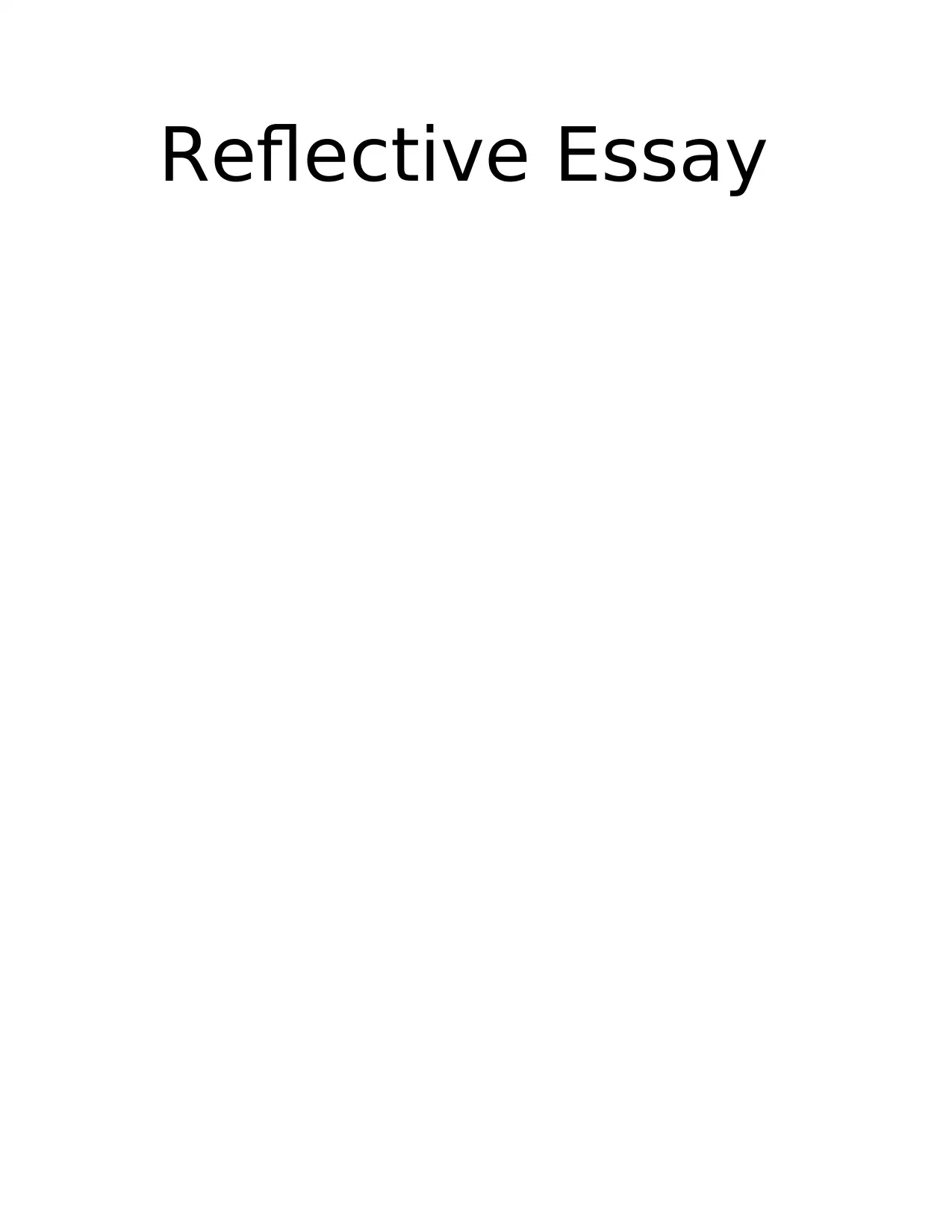
Reflective Essay
Paraphrase This Document
Need a fresh take? Get an instant paraphrase of this document with our AI Paraphraser
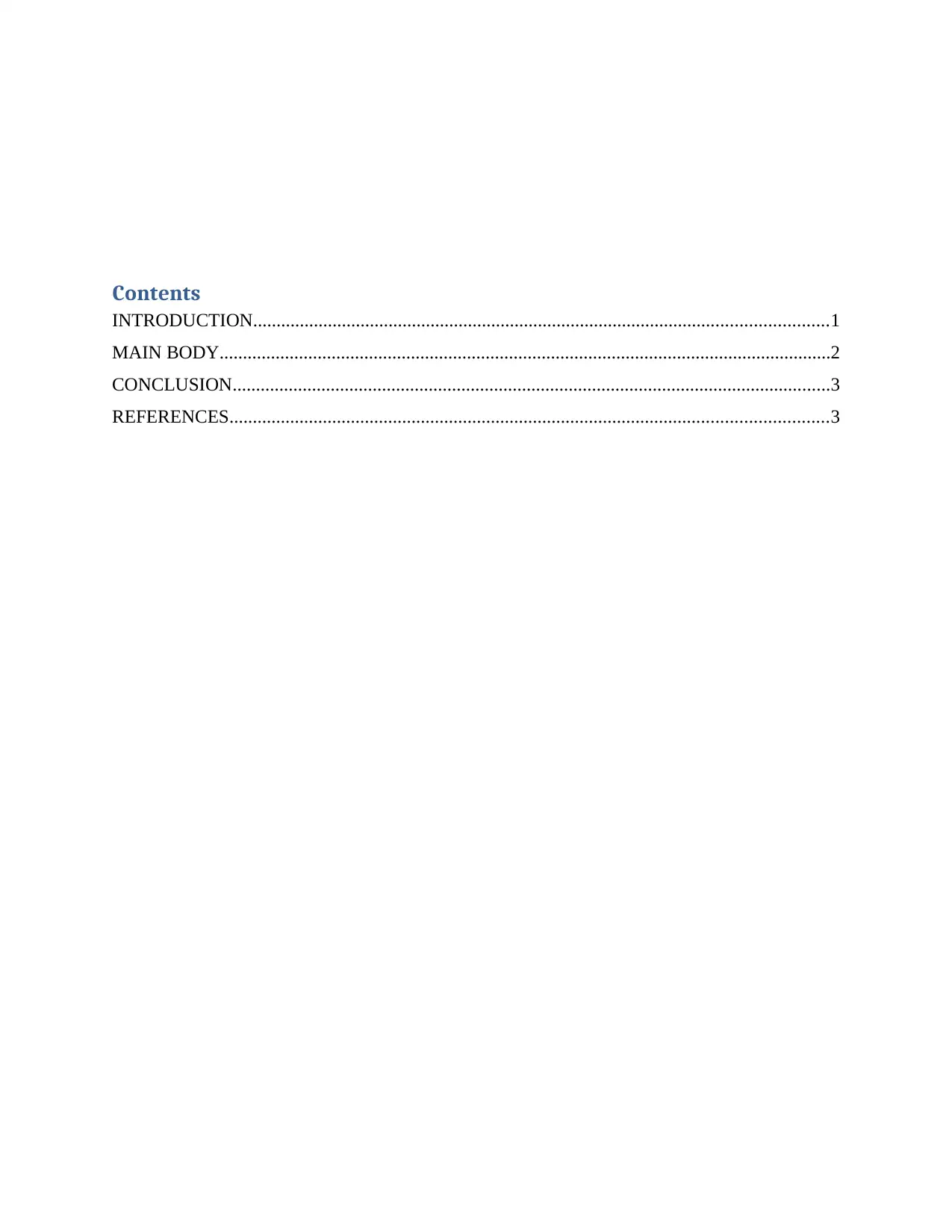
Contents
INTRODUCTION...........................................................................................................................1
MAIN BODY...................................................................................................................................2
CONCLUSION................................................................................................................................3
REFERENCES................................................................................................................................3
INTRODUCTION...........................................................................................................................1
MAIN BODY...................................................................................................................................2
CONCLUSION................................................................................................................................3
REFERENCES................................................................................................................................3
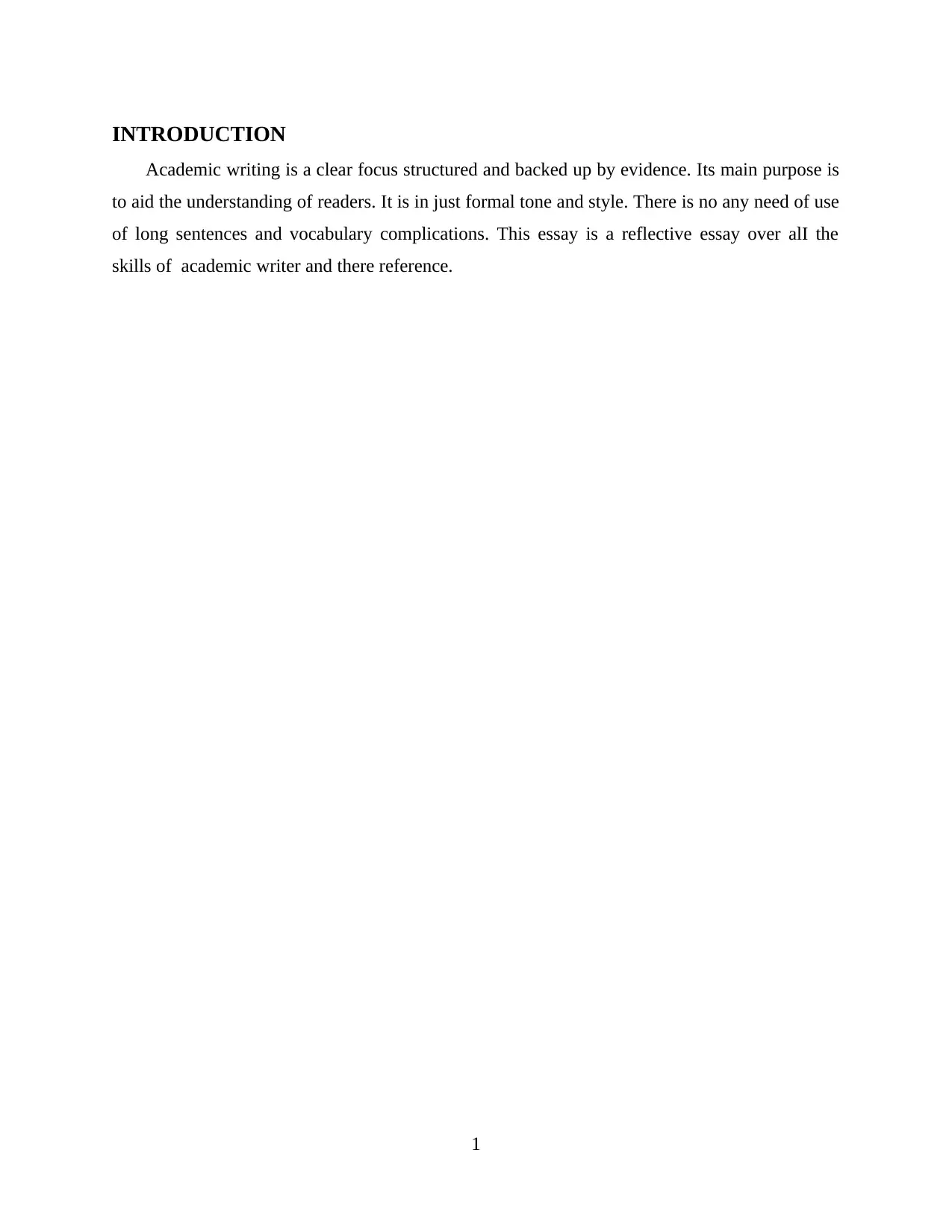
INTRODUCTION
Academic writing is a clear focus structured and backed up by evidence. Its main purpose is
to aid the understanding of readers. It is in just formal tone and style. There is no any need of use
of long sentences and vocabulary complications. This essay is a reflective essay over alI the
skills of academic writer and there reference.
1
Academic writing is a clear focus structured and backed up by evidence. Its main purpose is
to aid the understanding of readers. It is in just formal tone and style. There is no any need of use
of long sentences and vocabulary complications. This essay is a reflective essay over alI the
skills of academic writer and there reference.
1
⊘ This is a preview!⊘
Do you want full access?
Subscribe today to unlock all pages.

Trusted by 1+ million students worldwide
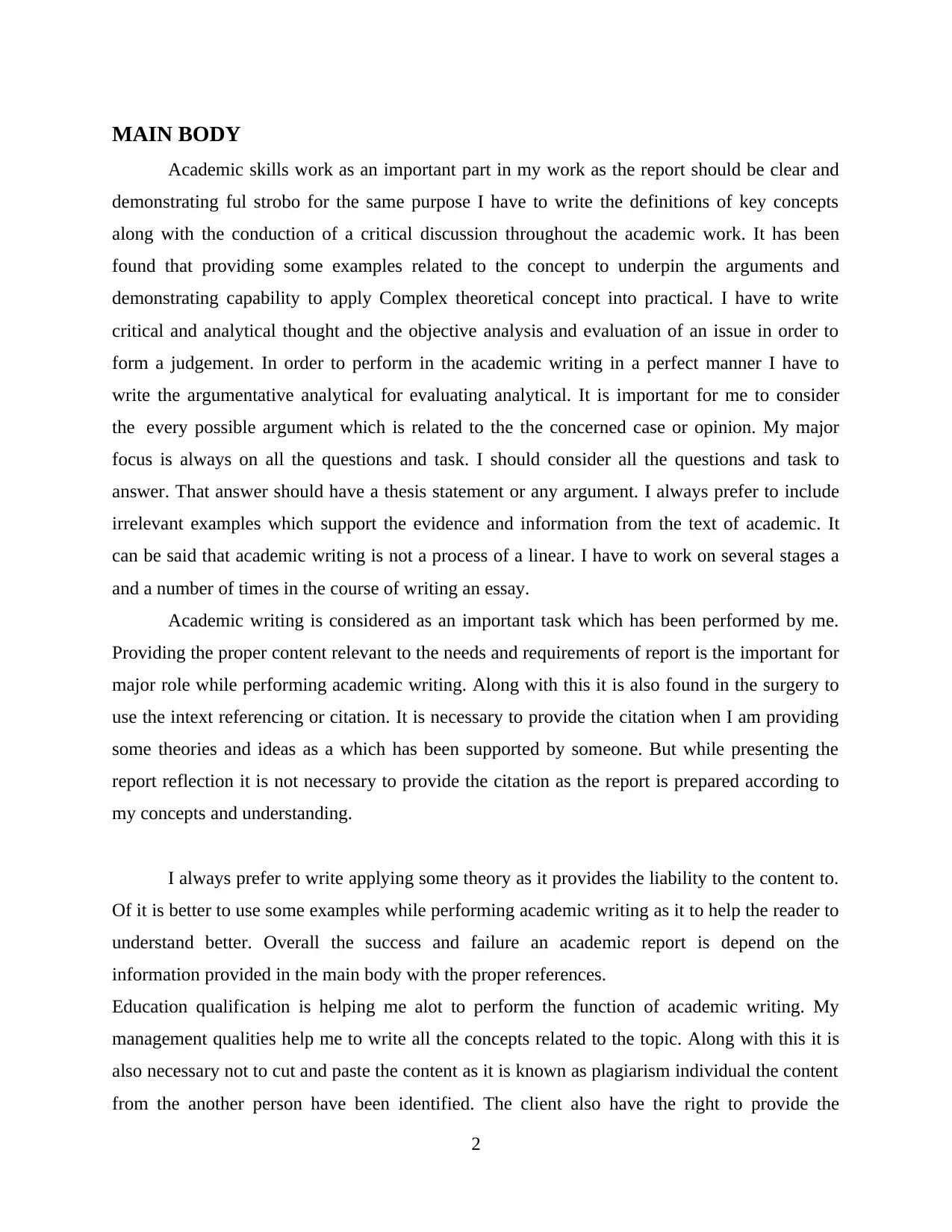
MAIN BODY
Academic skills work as an important part in my work as the report should be clear and
demonstrating ful strobo for the same purpose I have to write the definitions of key concepts
along with the conduction of a critical discussion throughout the academic work. It has been
found that providing some examples related to the concept to underpin the arguments and
demonstrating capability to apply Complex theoretical concept into practical. I have to write
critical and analytical thought and the objective analysis and evaluation of an issue in order to
form a judgement. In order to perform in the academic writing in a perfect manner I have to
write the argumentative analytical for evaluating analytical. It is important for me to consider
the every possible argument which is related to the the concerned case or opinion. My major
focus is always on all the questions and task. I should consider all the questions and task to
answer. That answer should have a thesis statement or any argument. I always prefer to include
irrelevant examples which support the evidence and information from the text of academic. It
can be said that academic writing is not a process of a linear. I have to work on several stages a
and a number of times in the course of writing an essay.
Academic writing is considered as an important task which has been performed by me.
Providing the proper content relevant to the needs and requirements of report is the important for
major role while performing academic writing. Along with this it is also found in the surgery to
use the intext referencing or citation. It is necessary to provide the citation when I am providing
some theories and ideas as a which has been supported by someone. But while presenting the
report reflection it is not necessary to provide the citation as the report is prepared according to
my concepts and understanding.
I always prefer to write applying some theory as it provides the liability to the content to.
Of it is better to use some examples while performing academic writing as it to help the reader to
understand better. Overall the success and failure an academic report is depend on the
information provided in the main body with the proper references.
Education qualification is helping me alot to perform the function of academic writing. My
management qualities help me to write all the concepts related to the topic. Along with this it is
also necessary not to cut and paste the content as it is known as plagiarism individual the content
from the another person have been identified. The client also have the right to provide the
2
Academic skills work as an important part in my work as the report should be clear and
demonstrating ful strobo for the same purpose I have to write the definitions of key concepts
along with the conduction of a critical discussion throughout the academic work. It has been
found that providing some examples related to the concept to underpin the arguments and
demonstrating capability to apply Complex theoretical concept into practical. I have to write
critical and analytical thought and the objective analysis and evaluation of an issue in order to
form a judgement. In order to perform in the academic writing in a perfect manner I have to
write the argumentative analytical for evaluating analytical. It is important for me to consider
the every possible argument which is related to the the concerned case or opinion. My major
focus is always on all the questions and task. I should consider all the questions and task to
answer. That answer should have a thesis statement or any argument. I always prefer to include
irrelevant examples which support the evidence and information from the text of academic. It
can be said that academic writing is not a process of a linear. I have to work on several stages a
and a number of times in the course of writing an essay.
Academic writing is considered as an important task which has been performed by me.
Providing the proper content relevant to the needs and requirements of report is the important for
major role while performing academic writing. Along with this it is also found in the surgery to
use the intext referencing or citation. It is necessary to provide the citation when I am providing
some theories and ideas as a which has been supported by someone. But while presenting the
report reflection it is not necessary to provide the citation as the report is prepared according to
my concepts and understanding.
I always prefer to write applying some theory as it provides the liability to the content to.
Of it is better to use some examples while performing academic writing as it to help the reader to
understand better. Overall the success and failure an academic report is depend on the
information provided in the main body with the proper references.
Education qualification is helping me alot to perform the function of academic writing. My
management qualities help me to write all the concepts related to the topic. Along with this it is
also necessary not to cut and paste the content as it is known as plagiarism individual the content
from the another person have been identified. The client also have the right to provide the
2
Paraphrase This Document
Need a fresh take? Get an instant paraphrase of this document with our AI Paraphraser
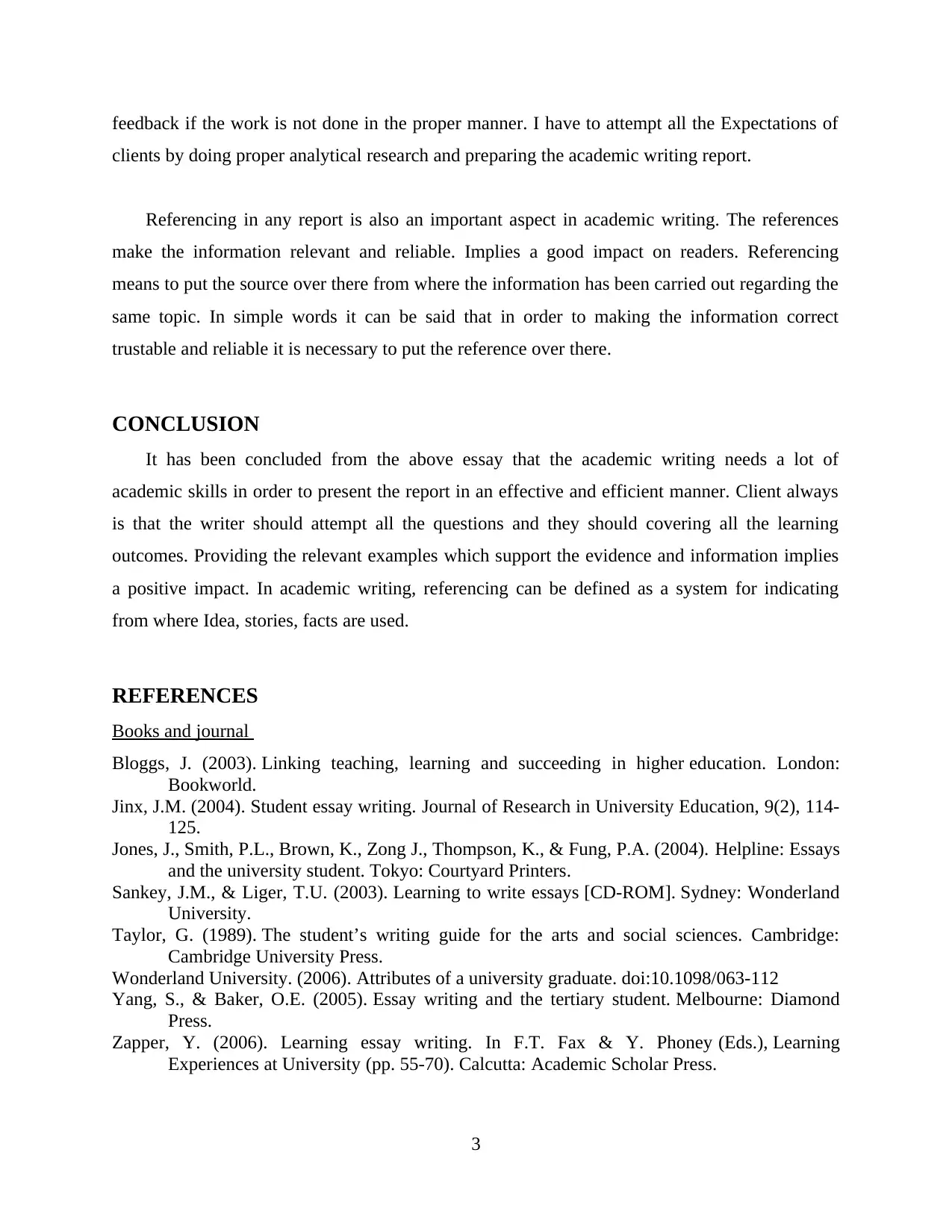
feedback if the work is not done in the proper manner. I have to attempt all the Expectations of
clients by doing proper analytical research and preparing the academic writing report.
Referencing in any report is also an important aspect in academic writing. The references
make the information relevant and reliable. Implies a good impact on readers. Referencing
means to put the source over there from where the information has been carried out regarding the
same topic. In simple words it can be said that in order to making the information correct
trustable and reliable it is necessary to put the reference over there.
CONCLUSION
It has been concluded from the above essay that the academic writing needs a lot of
academic skills in order to present the report in an effective and efficient manner. Client always
is that the writer should attempt all the questions and they should covering all the learning
outcomes. Providing the relevant examples which support the evidence and information implies
a positive impact. In academic writing, referencing can be defined as a system for indicating
from where Idea, stories, facts are used.
REFERENCES
Books and journal
Bloggs, J. (2003). Linking teaching, learning and succeeding in higher education. London:
Bookworld.
Jinx, J.M. (2004). Student essay writing. Journal of Research in University Education, 9(2), 114-
125.
Jones, J., Smith, P.L., Brown, K., Zong J., Thompson, K., & Fung, P.A. (2004). Helpline: Essays
and the university student. Tokyo: Courtyard Printers.
Sankey, J.M., & Liger, T.U. (2003). Learning to write essays [CD-ROM]. Sydney: Wonderland
University.
Taylor, G. (1989). The student’s writing guide for the arts and social sciences. Cambridge:
Cambridge University Press.
Wonderland University. (2006). Attributes of a university graduate. doi:10.1098/063-112
Yang, S., & Baker, O.E. (2005). Essay writing and the tertiary student. Melbourne: Diamond
Press.
Zapper, Y. (2006). Learning essay writing. In F.T. Fax & Y. Phoney (Eds.), Learning
Experiences at University (pp. 55-70). Calcutta: Academic Scholar Press.
3
clients by doing proper analytical research and preparing the academic writing report.
Referencing in any report is also an important aspect in academic writing. The references
make the information relevant and reliable. Implies a good impact on readers. Referencing
means to put the source over there from where the information has been carried out regarding the
same topic. In simple words it can be said that in order to making the information correct
trustable and reliable it is necessary to put the reference over there.
CONCLUSION
It has been concluded from the above essay that the academic writing needs a lot of
academic skills in order to present the report in an effective and efficient manner. Client always
is that the writer should attempt all the questions and they should covering all the learning
outcomes. Providing the relevant examples which support the evidence and information implies
a positive impact. In academic writing, referencing can be defined as a system for indicating
from where Idea, stories, facts are used.
REFERENCES
Books and journal
Bloggs, J. (2003). Linking teaching, learning and succeeding in higher education. London:
Bookworld.
Jinx, J.M. (2004). Student essay writing. Journal of Research in University Education, 9(2), 114-
125.
Jones, J., Smith, P.L., Brown, K., Zong J., Thompson, K., & Fung, P.A. (2004). Helpline: Essays
and the university student. Tokyo: Courtyard Printers.
Sankey, J.M., & Liger, T.U. (2003). Learning to write essays [CD-ROM]. Sydney: Wonderland
University.
Taylor, G. (1989). The student’s writing guide for the arts and social sciences. Cambridge:
Cambridge University Press.
Wonderland University. (2006). Attributes of a university graduate. doi:10.1098/063-112
Yang, S., & Baker, O.E. (2005). Essay writing and the tertiary student. Melbourne: Diamond
Press.
Zapper, Y. (2006). Learning essay writing. In F.T. Fax & Y. Phoney (Eds.), Learning
Experiences at University (pp. 55-70). Calcutta: Academic Scholar Press.
3

4
⊘ This is a preview!⊘
Do you want full access?
Subscribe today to unlock all pages.

Trusted by 1+ million students worldwide
1 out of 6
Related Documents
Your All-in-One AI-Powered Toolkit for Academic Success.
+13062052269
info@desklib.com
Available 24*7 on WhatsApp / Email
![[object Object]](/_next/static/media/star-bottom.7253800d.svg)
Unlock your academic potential
Copyright © 2020–2026 A2Z Services. All Rights Reserved. Developed and managed by ZUCOL.




